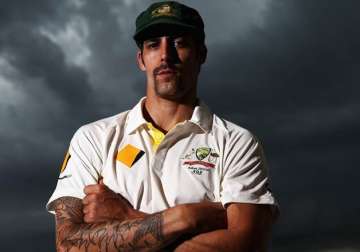Aussie speedster Mitchell Johnson to retire after Perth Test
Perth: Mitchell Johnson decided his international cricket career should end after the 2nd test against New Zealand at his adopted home ground, a fitting venue synonymous with fast bowling.The 34-year-old Australian paceman issued a statement

Perth: Mitchell Johnson decided his international cricket career should end after the 2nd test against New Zealand at his adopted home ground, a fitting venue synonymous with fast bowling.
The 34-year-old Australian paceman issued a statement Tuesday before the last day of the WACA test, saying "beyond this match I'm just not sure that I can continue competing consistently at the level required to wear the baggy green."
He has 311 test wickets, fourth on the list of Australia's test wicket-takers behind Shane Warne (708), Glenn McGrath (563) and Dennis Lillee (355). At his best he was arguably the most intimidating fast bowler of his era but could also be erratic.
"I feel now is the best time to say goodbye," Johnson said. "It's been an incredible ride. But the ride has to come to an end at some point and to do so here at the WACA is very special."
Johnson has been the backbone of Australia's bowling attack in 73 tests but realized after the first innings at Perth, when he struggled for pace and recorded figures of 1-157, that he may struggle to return to his former heights.
"I've given the decision a lot of thought," Johnson said. "My career has certainly had its up and downs but I can honestly say I have given it my all and am proud of everything I have achieved."
Johnson's career reached its peak during the 2013-2014 Ashes series against England in which he took 37 wickets in five tests, having worked with Lillee to fine-tune his action and then channeling the former test great by growing the kind of moustache that added a sense of menace to his appearance.
He was equally damaging in Australia's subsequent series against South Africa and across those two series he took 59 wickets at an average of 15.
But the physical rigors of fast bowling have begun to tell and Johnson's pace has seemed reduced in recent matches.
"My family have been by my side throughout and I could not have achieved all I have without their support," Johnson said. "The encouragement I have received (from fans) has been extremely humbling and playing in front of them is certainly something I will miss."
Johnson made his first-class debut for Queensland in 2001-2002 and reveled in the conditions at the Gabba, where the pace and bounce have helped Australia maintain an unbeaten run in Brisbane tests since 1988. He moved across the country to Perth, and was equally at home at a WACA ground that also favors pace.
He could still finish on a high at home if Australia set New Zealand a sporting target and push for a series-claiming victory in Perth before the teams meet in Adelaide for the first ever day-night test match.
Australia will resume the last day 193 runs ahead, but with the wicket playing batsman friendly so far makes a draw the most likely outcome at this stage.
Johnson said winning the Ashes series last summer and the Cricket World Cup in Australia earlier this year were the highlights of his career.
His test career that began against Sri Lanka at the Gabba in 2007 and peaked during summer of 2013-14 when his 59 wickets in eight tests earned him the Allan Border Medal at the age of 32.
Once considered an allrounder, Johnson scored 2,036 test runs and posted one century — an unbeaten 123 against South Africa at Cape Town in 2008/09 — and 11 half centuries.
One of the quickest bowlers in modern era, Johnson also played in 153 limited-overs internationals for Australia and took 239 wickets and scored 951 ODI runs.
Australia's bowling coach Craig McDermott credited Johnson for helping to transform test cricket with his aggressive approach to the game.
"His record speaks for itself," McDermott said. "He's one of the best fast bowlers to play for this country, and one of the fastest bowlers in the world.
"He brought test cricket back to life in the country and around the world. He changed a lot of the tactics, not only the way the Australian team plays but also how other teams around the world who have decent quicks played the game as well."